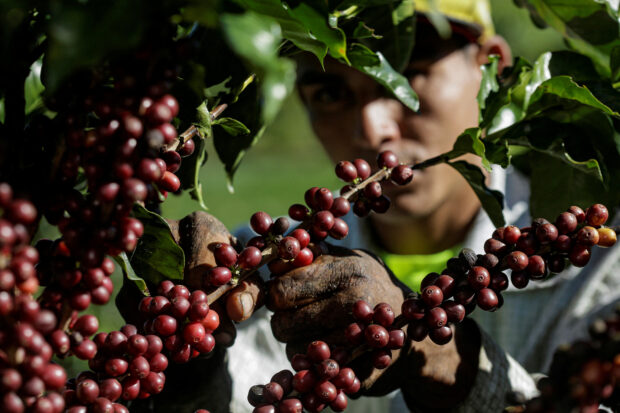In Grecia, Costa Rica, a worker is diligently picking ripe coffee cherries at a coffee plantation. This snapshot captures the essence of the coffee industry, where the quality of hand-picked premium beans has long been valued. However, a new development is challenging this tradition.
Traders in the industry have noted the arrival of Brazilian Arabica coffee on the world’s main price-setting market. Traditionally considered lower grade, these Brazilian beans, known as unwashed or ‘natural’ arabicas, are now being included in the bags used to settle benchmark coffee contracts worldwide. This structural change in the market is expected to have a long-term impact on coffee prices.
The inclusion of these Brazilian beans is attributed to their improved taste and quality. Brazil, an agricultural powerhouse, is responsible for nearly half of the world’s arabica production, with much of it harvested by machines on large plantations. While Brazilian farmers have historically focused on producing washed arabicas, their unwashed and semi-washed varieties have undergone improvements in taste over time.
The Intercontinental Exchange (ICE), the main exchange for coffee futures contracts, has not explicitly acknowledged this change in the types of beans backing its contracts. However, the exchange claims that its grading process is designed to maintain quality standards. ICE asserts that samples with an unwashed flavor would fail the grading process.
While this news may be welcomed by cost-conscious consumers battling food price inflation, it poses a threat to smaller farms in Latin America and Africa. These farms, often characterized by steep and shaded slopes unfit for mechanized harvesting, may struggle to compete with Brazilian production. Dagoberto Suazo, president of the Central de Cooperativas Cafetaleras in Honduras, expresses concern about the potential increase in poverty among small-scale producers in his country.
The Coffee C Futures contract on ICE traditionally represents premium-grade washed arabica coffee. However, the growing presence of Brazilian unwashed and semi-washed coffee in these contracts challenges this tradition. Traders estimate that approximately 30% of the approved stock in ICE warehouses is now sourced from Brazil, with most of the bags containing unwashed grades.
ICE’s rules do not explicitly prohibit the approval of unwashed Arabicas for contract settlement, but they require the beans to be free from “unwashed flavors.” The nature of unwashed coffee, where the bean is extracted from the dried whole fruit, makes it challenging to discern unwashed flavors, especially when mixed with premium grades.
Brazil’s coffee exporters association, Cecafe, asserts that the quality and sustainability of all Brazilian coffees have been improving consistently over the years. They believe that ICE’s approval process ensures that each lot of coffee meets established quality parameters.
However, the large volume of Brazilian beans entering ICE warehouses has been a long-standing threat to Arabica producers. The surge in Brazilian beans arriving at ICE began in 2020, with suspicions that cheaper unwashed beans were being mixed in with semi-premium grades. The daily stocks data released by ICE, which serves as an indicator of excess global coffee supply, may come under pressure as the amount of stock backing contracts increases.
Despite the growing global population’s demand for premium-grade arabica coffee, the output has stagnated in Central America due to low prices. The prices of coffee futures have significantly declined over the years, making it difficult for small farmers to turn a profit. As a result, many farmers are forced to migrate to find better opportunities.
In conclusion, the inclusion of Brazilian unwashed arabica coffee in the world’s main price-setting market marks a significant change in the coffee industry. While it may benefit consumers, it poses challenges for smaller farms in Latin America and Africa. The impact on coffee prices and the livelihoods of producers remains to be seen.
Denial of responsibility! SamacharCentrl is an automatic aggregator of Global media. In each content, the hyperlink to the primary source is specified. All trademarks belong to their rightful owners, and all materials to their authors. For any complaint, please reach us at – [email protected]. We will take necessary action within 24 hours.

Omprakash Tiwary is a business writer who delves into the intricacies of the corporate world. With a focus on finance and economic landscape. He offers readers valuable insights into market trends, entrepreneurship, and economic developments.


